直译和意译(汉英句子翻译)
- 格式:ppt
- 大小:87.50 KB
- 文档页数:12
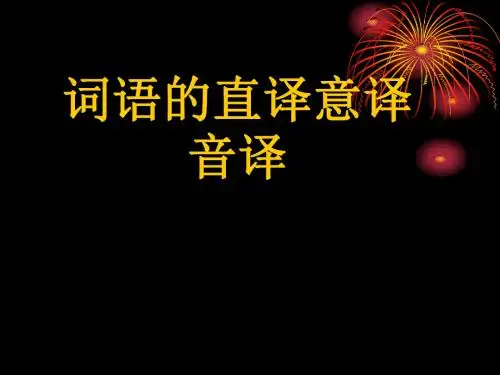
![[转载]翻译第三讲参考译文(直译意译)](https://uimg.taocdn.com/d69a98e14793daef5ef7ba0d4a7302768e996f13.webp)
[转载]翻译第三讲参考译⽂(直译意译)原⽂地址:翻译第三讲参考译⽂(直译意译)作者:⽯壁头翻译第三讲参考译⽂直译Vs意译⼆、翻译总原则▲该直译就直译:(1).No matter what may happen, the Chinese people will firmly support the oppressed people of the world.译⽂:不管发⽣什么事情,中国⼈民都要坚定地⽀持世界上被压迫的⼈民。
(2).Exchange of idea is necessary, for without it, it is impossible to achieve mutural understanding.译⽂:思想交流是必要的,因为没有思想交流,便不可能达到相互了解。
(3).创新是⼀个民族的灵魂。
Innovation is the soul of a nation.(4).黛⽟说:你说你会过⽬成诵,难道我就不能⼀⽬⼗⾏了!意译:You needn't imagine you are the only one with a good memory,” said Dai-yu naughtily. “I suppose I'm allowed to remember lines too if I like. (David Hawks)直译:You boast that you can memorize a passage with one reading. Why can't I learn ten lines at one glance?(杨宪益;戴乃迭)▲直译造成意义晦涩:(1).It's a Smoke Free Area.意译:这是个⽆烟区。
(2).Shakespeare put his hometown on the map.意译:莎⼠⽐亚使他的家乡声名远仰。
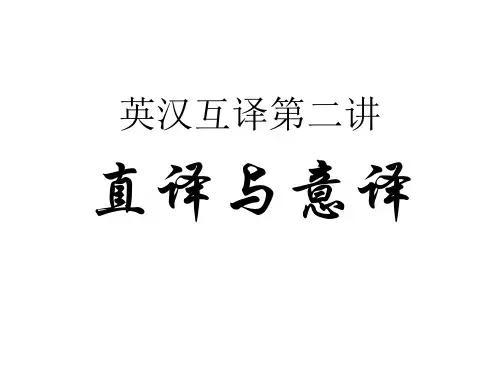


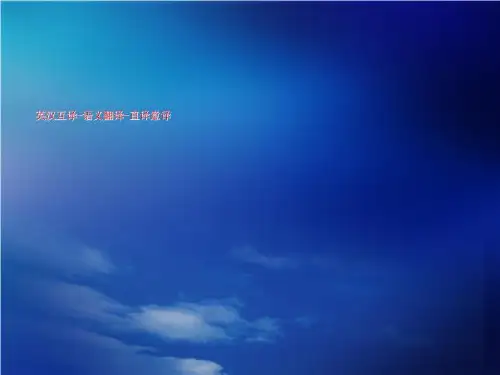
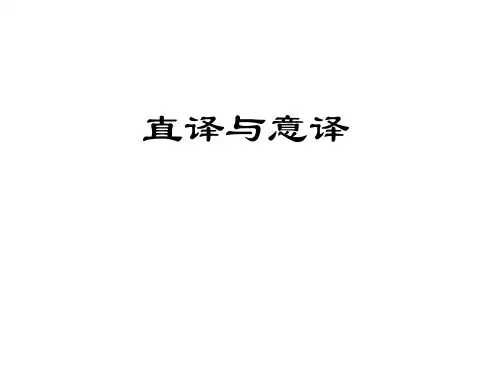
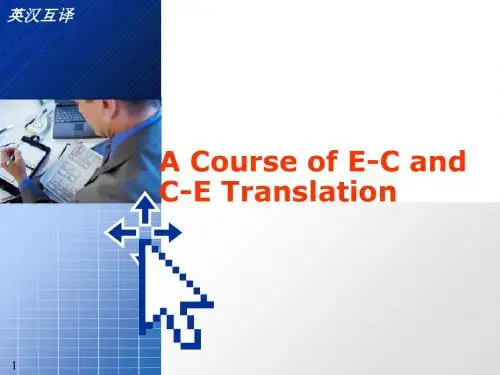
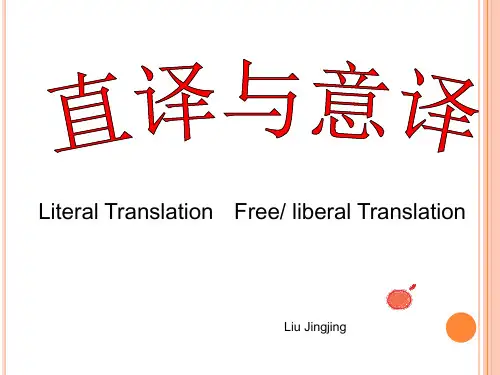
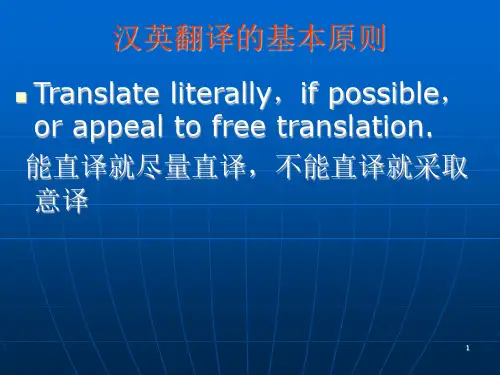
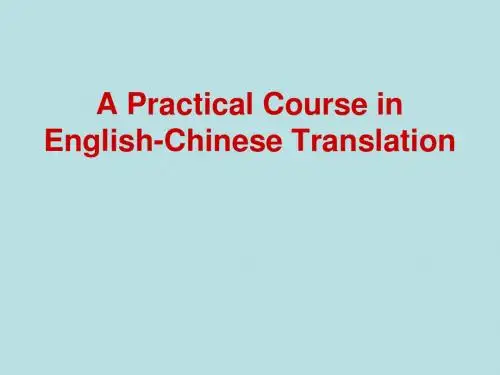
英语翻译的方法英语翻译是将一种语言的信息转化为另一种语言的过程。
翻译不仅仅是简单地转译单词和句子,还需要考虑词语的含义、语法结构、上下文以及文化背景等因素。
下面将介绍一些常用的英语翻译方法。
1. 直译法(Literal Translation):直译法是将原文逐字逐句地翻译成目标语言,不考虑语法和语言特点。
这种方法简单直接,但可能导致翻译不符合目标语言的表达习惯和语法规则。
2. 逐句翻译法(Sentence-by-Sentence Translation):逐句翻译法是按照原文的句子顺序逐句翻译。
这种方法可以保持原文的结构和顺序,但可能会忽略上下文的语境和顺序。
3. 意译法(Transliteration):意译法是将原文所表达的意思翻译成与目标语言的表达方式最接近的词汇和句子。
这种方法更注重词语的意义和表达方式,可以更好地传达原文的意思,但可能会损失原文的细节和形式。
4. 适应法(Adaptation):适应法是根据目标语言的语法和表达习惯来调整原文的翻译。
这种方法可以使翻译更符合目标语言的表达规范,但也可能改变原文的结构和意义。
5. 文化转化法(Cultural Transformation):文化转化法是将原文的文化背景和特点转化成目标语言所对应的文化背景和特点。
这种方法更注重传达原文的文化内涵,但也需要对两种文化有深入的了解。
6. 修饰法(Modifiers):修饰法是通过添加修饰词或从句来翻译原文,以更准确地传达原文的意思。
这种方法可以充分利用目标语言的语法和语言特点,并且在翻译中添加适当的修饰可以更好地表达原文的细节和含义。
7. 重组法(Recombination):重组法是将原文的句子重组成不同的语序和结构,以符合目标语言的表达方式。
这种方法可以提高翻译的流畅性和可理解性,但需要保持原文的意义不变。
总之,英语翻译需要根据原文的特点和目标语言的表达习惯选择不同的翻译方法。
在翻译过程中,译者还需要注重语法和语言的准确性,并结合上下文和文化背景进行翻译,以保证翻译的质量和准确性。
A●矮子里拔将军直:pick a general from among the dwarfs意:select someone for lack of a better one;select from among the mediocre/ run-of-millB●八字还没一撇直:Not even the first stroke of the character “八” has happened.意:Nothing tangible is in sight.Things aren’t even starting to take place yet.There is no sign of anything happening yet.Things are still up in the air.●班门弄斧直:Wield the axe before Lu Ban (the ancient master carpenter).意:display one’s learning or parade one’s skill in the presence of anexpert;teach one’s grannie how to suck egges;bring coal to Newcastle●杯弓蛇影直:mistake the shadow of a bow in the cup for a snake意:self-created suspicion;imaginary fears;be extremely nervous and suspicious●杯水车薪直:try to put out a carload of burnig firewood with a cup of water意:a useless attempt;a drop in the bucket;utterly inadequate measure●背水一战直:fight with one’s back to the river or wall意:fight to win or die;fight a last-ditch battle;put up a desperate fight●冰冻三尺,直:It takes more than one cold day to freeze three feet of ice.非一日之寒意:The trouble is deep-rooted;Rome was not built in a day.●兵来将挡,直:stop an advancing army with troops and onrushing water withearth水来土掩意:counter move for move;counter measure for measure●不以规矩,直:You cannot draw squares and circles without the campass andsquare.不成方圆意:Nothing can be accomplished without norms and standards.C●草木皆兵直:take every grass and tree as an enemy soldier意:a state of extreme nervousness, as if surrounded by enemies●沧海桑田直:Seas change into mulberry fields.意:Time brings great change to the world.(饱经沧桑:have experienced many vicissitudes of life)●赤膊上阵直:go into battle stripped to the waist意:take personal charge and go it alone despite opposition;Throw away all disguise and tactics;come out into the open as a result of desperation or foolhardiness ●此地无银直:The 300 taels of silver are not buried here (a sign put up by the man inthe三百两folk tale over the place where he had hidden the money)意:A clumsy self-exposing performance or denial;A guilty person gives himself away by conspicuously protesting hisinnocence;Protest one’s innocence too much.●吹胡子瞪眼直:froth at the mouth and glare with rage意:snort and stare in anger;fume with rage●唇亡齿寒直:If the lips are gone, the teeth will be exposed.意:If one of two interdependent things falls, the other is in danger.●吹毛求疵直:blow upon the hair trying to discover a flaw意:find fault with;pick holes in●寸有所长,直:An inch has its length and a foot sometmes falls short.尺有所短意:Everybody has his strennths and weaknesses.D●打肿脸直:Try to look fat by slapping one’s face till it’s swollen.充胖子Boast about one’s pink cheek after having been slapped.意:Do something beyond one’s means in order to look impressive;try to satisfy one’s vanity when one cannot really afford to do so●当一天和尚直:go on tolling the bell as long as one remains a monk.撞一天钟意:do the minimum required or do as little as possible to get by;do the least that is expected of one;take a passive attitude towards one’s work●调虎离山直:lure the tiger out of his mountain or lair意:tempt or entice somebody into leaving his vantage ground●叠床架屋直:pile one bed upon another or build one house on top of another意:needless duplication;repetition and superfluity●东方不亮直:When there is dark in the east, it is light in the west;西方亮,When things are dark in the south, there is still light in the north.黑了南方有北方意:There is alsways plenty of room for manoeuvring.EF●放长线直:throw a long line to catch a big fish钓大鱼意:devise a long-term plan to secure something big●翻手为云直:produce clouds with one turn of the hand and rain with another覆手为雨意:wield one’s power capriciously;be shifty and capricious;be tricky and deceitful●放马后炮直:fire belated shots意:comment on something when it is already over;fail to give timely advice;be a Monday morning quarterback●风声鹤唳直:scared by the moan of the wind and the cry of the cranes, and seeingthe草木皆兵enemy in every bush and tree意:describing the extreme nervousness of a fleeing army’s suspicion ofdanger at the slightest sound●风调雨顺直:The elements are propitious, the country is prosperous and thepeople are国泰民安at peace.意:favorable climate, prosperity and peace●风雨同舟直:in the same storm-tossed boat意:stand together through thick and thin;share weal and woe;help each other in distress;share the same fate with;cast in one’s lot with●佛面蛇心直:have a Buddha’s face but a viper’s heart意:be honey-lipped but evil at heart;be a malicious hypocrite●佛要金装直:As Buddha needs a gilt statue, man needs fine clothes.人要衣装意:Fine feather make fine birds; Fine clothes make the man.●釜底抽薪直:pull out the burning firewood from under a cauldron意:take drastic measures to deal with a critical situation;cut the ground from under somebody’s feet;tackle the root cause●赴汤蹈火直:be ready to jump into boiling water and plunge into raging fire意:go through hell and high water;be ready to risk one’s lifeG●肝脑涂地直:be ready to dash one’s brains out or scatter one’s innards on theground意:be ready to lay down one’s life for a cause;be willing to repay a favor with extreme sacrifice●赶鸭子上架直:drive a duck onto a perch意:make somebody do something entirely beyond him●隔岸观火直:watch a fire from the other side of a river意:look on at somebody’s misfortune with indifference;show no concern for another’s trouble●狗咬吕洞宾直:snarl and snap at Lü Dongbin (one of the eight immortals in Chinesemythology)意:mistake a good man for a bad one(狗咬吕洞宾,不识好人心。
【大学笔译精品】直译与意译(例子)
在翻译过程中,有时需要选择直接翻译(直译)或意译。
直译指翻译原文时保持原意,不做任何添加或删减;而意译则是在保持原意的基础上,根据翻译对象的习惯和文化特点作适当的调整,使译文更符合读者的习惯和理解。
以下是一些例子,帮助理解什么时候适合进行直译或意译。
直译:
例1:
原文:不懂装懂,反被人看轻。
译文:Pretending to understand only makes you look foolish.
这句话的翻译是一种较为直接的翻译,它保持了原来的意思。
原文:天方夜谭
译文:A wild and improbable tale
“天方夜谭”这个词组做为名称,在英文中没有一个完全等效的词汇。
直接翻译成“Tianfangyeytan”意义不明,因此作者决定使用意会的翻译“wild and improbable tale”。
原文:你吃了吗?
“你吃了吗?”在中文文化中是一种关心的表示方式,在英文中没有直接的翻译。
“How have you been lately?”是适当的意译,使翻译更加符合英语的表达方式。
原文:红楼梦
“红楼梦”这个书籍在英文中没有一个直接的翻译,因此翻译成“Dream of the Red Chamber”,也是一种适当的意译,以使红楼梦在英文读者中更容易传播和理解。
总之,在选择直译或意译是要根据具体情况来决定。
在保持原意的基础上,利用意译可以使翻译更贴切,更易理解。